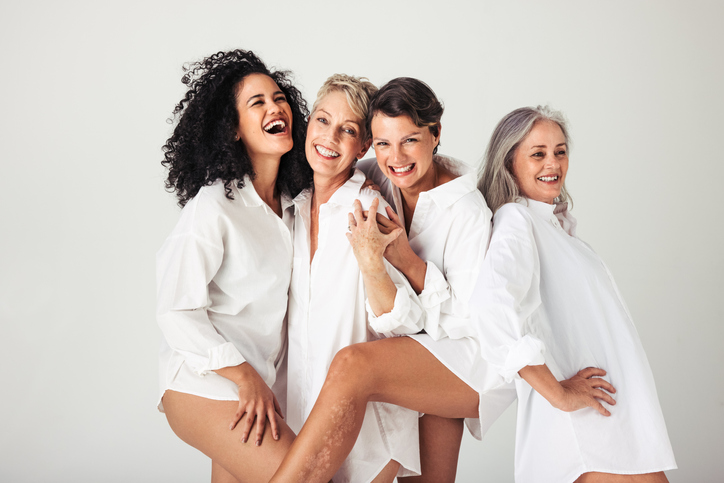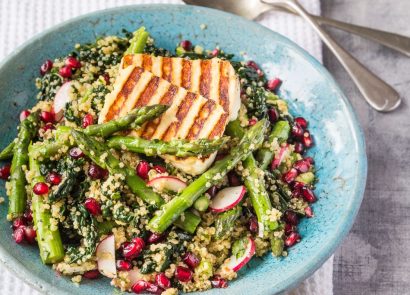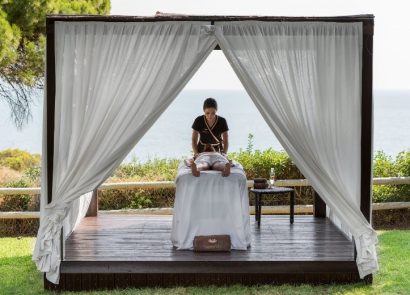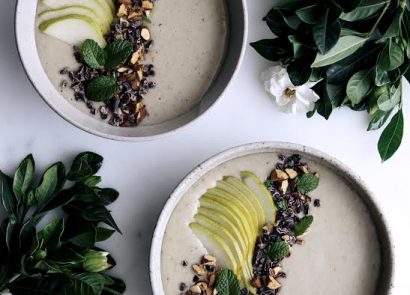It can be a confronting experience to look in the mirror and see a body you don’t recognise. Even the most self-assured among us can surely suffer a crisis of confidence when we notice our bodies don’t look like they used to – and it can strike at any time. Maybe you’re approaching menopause and are feeling self-conscious about sagging skin or perhaps you’ve just welcomed a new arrival and are struggling to accept your post-partum body. Perhaps you’ve simply lost or gained a few pounds and feel aghast that your clothes no longer fit the way they used to. Changing bodies take many forms, and often, adapting to them can take some mental and emotional graft.
“When at some point in our life our body starts changing, we may start challenging how we see ourselves and therefore, how we feel and value ourselves and our abilities,” explains clinical psychologist Patapia Tzotzoli. “A fragile self-image is based on unrealistic views or expectations of the self and tends to be linked with low self-esteem, confidence and resilience. As a result, when life events, such as getting older or falling pregnant, take place and our body changes, we find it hard to cope.”
Often these changes can prompt us to be pretty nasty to ourselves and we might indulge in negative self-talk, judgement and selfcriticism. Patapia says this can often manifest itself in phrases such as “I hate my…”, “I wish I didn’t have…” and belittling comments such as fat, ugly and disgusting.
Fortunately, if this experience is ringing true for you, there are steps you can take to rebuild your confidence and cultivate a resilient relationship with your body – one that isn’t curtailed by the normal and natural changes it experiences throughout a lifetime.
Try to appreciate your body for what it can do
Anupa Roper, a positive body image educator, says one of the first things you can do is to shift your focus from how your body looks to all the incredible things it’s capable of. “If you have had a baby, consider how amazing it is that your body was able to do that. If your body has aged, consider what a privilege that is. Think about what your body allows you to do, feel and experience,” she advises.
Notice self-judgment
Awareness is often the first step to change, and Anupa believes that by noticing your selfjudgmental thoughts you can begin to change the way you see your body. “Notice when you judge yourself and replace those negative thoughts with positive ones,” she advises.
To take this process a step further, you might like to use a journal and for greater insight into how you speak to yourself, Patapia recommends putting pen to paper. “By tuning in and keeping a journal of our experiences, a chronicle of our thoughts, feelings and behaviour, we start increasing our awareness of our relationship with our body and the nature of our self-talk,” she explains. “This exercise helps us become aware of our patterns, and eventually gives us the freedom to respond and engage differently to our current situation.”
Challenge your perceptions
Our perception of ourselves is shaped, in part, by the world around us. And Anupa believes that unrealistic beauty standards play a massive part in the way we feel about our bodies. “We are living in a world where physical appearance is placed high in importance. Post-baby figures, older bodies and shapes that don’t fit into the beauty standards are portrayed in a negative light,” she points out.
For Patapia, the key to addressing this is challenging the way we think. The next time you notice you’re indulging in judgmental thoughts about your body, she advises asking yourself: “Is there another way to look at this?”.
“This exercise helps us identify other potential responses that we have overlooked and enriches our perspective of the situation,” she explains.
Practice self-acceptance
For many of us, self-love is a tall order. When you’ve spent a significant portion of your life berating your body, it can be difficult to simply flip the script and decide to love yourself as you are. But self-acceptance can help you make that transition. “Working towards self-acceptance is a hard task but also a huge step towards self-worth,” explains Patapia. “It’s our unique qualities that give us an inherent value (and the belief that we are enough as we are) so identifying them and accepting ourselves with our imperfections is essential in changing our relationship with our body.”
There are many ways to begin accepting yourself just as you are. Patapia recommends speaking to yourself with compassion and kindness, practising gratitude, repeating positive affirmations and making a list of everything you like about your appearance and personality.
Set self-care goals
Challenging our bodies with realistic goals can give us a deeper appreciation for what they can do. After all, few things taste sweeter than smashing a health and fitness target or achieving something you previously thought your body could not do.
Whether it’s setting a personal best for a 5k run or adding weight to your squat, Patapia says the key is to be realistic with your goals and to celebrate your wins. Doing so can build better body image.
Remember future generations
Developing a more loving relationship with our bodies isn’t just about us, but the generation that comes after, and, if you have daughters or other little ones in your life, you may be conscious of setting the right example. Patapia says: “Reinforcing the concept that they are unconditionally loved and accepted will help them cultivate the courage to be imperfect shamelessly and as such feel worthy for who they are and not how they look.”
Anupa advises focusing attention away from appearance and giving children nonappearance- based compliments. She also says to be mindful of the language you use when talking about bodies around kids. By and large, though, she says, the most important thing you can do is lead by example, and that starts by having a loving relationship with your own body.
It can be easy to defer body confidence. We might tell ourselves we’ll be happier when we lose a few pounds, tone our tummy, or minimise our stretch marks, but true body confidence is free of conditions. It’s about being comfortable in the skin you’re in now – and knowing that no matter how it changes, your body is still worthy of respect and appreciation.
Activities to boost positive self-talk
If that inner critic gets too loud, there are some simple ways to shut her down and instead nurture a more positive inner voice. Certified health and life coach and founder of the Mindful Eyes Movement method (mindful-eyes.com) Rochelle Knowles recommends getting in the habit of giving yourself a pep talk each day. “Every morning, look in the mirror at your beautiful face and body and speak aloud all the qualities you love about yourself. I also encourage my clients to finish with ‘I love you’ until they really mean it.” Or, try writing a love letter to yourself, as Camilla Sacre- Dallerup, author of It’s Not You, It’s Me (£9.99, Watkins) suggests: “Mention as many nice things you can think of about yourself and really allow yourself to feel each word. Another example is to write how proud you are of yourself for handling a situation in the way you did. You can read your letter back to yourself if you want to. This experience is for you, so make it an act of self-love.”




















